Fleurs du Mal Magazine


Or see the index
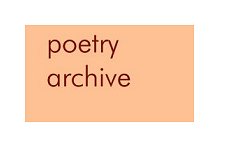
Hugo von Hofmannsthal
(1874-1929)
Mädchenlied
»Was rinnen dir die Tränen,
Die Tränen stumm und heiß,
Durch deine feinen Finger,
Die Finger fein und weiß?«
Mein Schleier ist zerrissen
Und wehet doch kein Wind
Und bin doch nirgends gangen
Niemals, wo Dornen sind …
Die Glocken haben heute
So sonderbaren Klang,
Gott weiß, warum ich weine,
Mir ist zum Sterben bang.
Hugo von Hofmannsthal poetry
fleursdumal.nl magazine
More in: Archive G-H, Hofmannsthal, Hugo von

Rob Stuart: Vanishing Point
fleursdumal.nl magazine
More in: Rob Stuart, Rob Stuart, Stuart, Rob

The Sorrows of Young Werther (41) by J.W. von Goethe
MAY 25.
I have had a plan in my head of which I did not intend to speak to you
until it was accomplished: now that it has failed, I may as well mention
it. I wished to enter the army, and had long been desirous of taking
the step. This, indeed, was the chief reason for my coming here with the
prince, as he is a general in the service. I communicated my design to
him during one of our walks together. He disapproved of it, and it would
have been actual madness not to have listened to his reasons.
JUNE 11.
Say what you will, I can remain here no longer. Why should I remain?
Time hangs heavy upon my hands. The prince is as gracious to me as any
one could be, and yet I am not at my ease. There is, indeed, nothing
in common between us. He is a man of understanding, but quite of the
ordinary kind. His conversation affords me no more amusement than I
should derive from the perusal of a well-written book. I shall remain
here a week longer, and then start again on my travels. My drawings are
the best things I have done since I came here. The prince has a taste
for the arts, and would improve if his mind were not fettered by cold
rules and mere technical ideas. I often lose patience, when, with
a glowing imagination, I am giving expression to art and nature, he
interferes with learned suggestions, and uses at random the technical
phraseology of artists.
JULY 16.
Once more I am a wanderer, a pilgrim, through the world. But what else
are you!
JULY 18.
Whither am I going? I will tell you in confidence. I am obliged to
continue a fortnight longer here, and then I think it would be better
for me to visit the mines in–. But I am only deluding myself thus. The
fact is, I wish to be near Charlotte again, that is all. I smile at the
suggestions of my heart, and obey its dictates.
JULY 29.
No, no! it is yet well all is well! I her husband! O God, who gave me
being, if thou hadst destined this happiness for me, my whole life would
have been one continual thanksgiving! But I will not murmur–forgive
these tears, forgive these fruitless wishes. She–my wife! Oh, the very
thought of folding that dearest of Heaven’s creatures in my arms! Dear
Wilhelm, my whole frame feels convulsed when I see Albert put his arms
around her slender waist!
And shall I avow it? Why should I not, Wilhelm? She would have been
happier with me than with him. Albert is not the man to satisfy the
wishes of such a heart. He wants a certain sensibility; he wants–in
short, their hearts do not beat in unison. How often, my dear friend,
I’m reading a passage from some interesting book, when my heart and
Charlotte’s seemed to meet, and in a hundred other instances when our
sentiments were unfolded by the story of some fictitious character, have
I felt that we were made for each other! But, dear Wilhelm, he loves her
with his whole soul; and what does not such a love deserve?
I have been interrupted by an insufferable visit. I have dried my tears,
and composed my thoughts. Adieu, my best friend!
The Sorrows of Young Werther (Die Leiden des jungen Werther) by J.W. von Goethe. Translated by R.D. Boylan.
To be continued
fleursdumal.nl magazine
More in: -Die Leiden des jungen Werther, Goethe, Johann Wolfgang von
Guy de Maupassant
(1850-1893)
L’ESPÉRANCE ET LE DOUTE
Lorsque le grand Colomb, penché sur l’eau profonde,
A travers l’Océan crut entrevoir un monde,
Les peuples souriaient et ne le croyaient pas.
Et pourtant, il partit pour ces lointains climats ;
Il partit, calme et fort, ignorant quelle étoile
Dans les obscures nuits pourrait guider sa voile,
Sur quels gouffres sans fond allaient errer ses pas,
Quels écueils lui gardait la mer immense et nue,
Où chercher par les flots cette terre inconnue,
Et comment revenir s’il ne la trouvait pas.
Parfois il s’arrêtait, las de chercher la rive,
De voir toujours la mer et rien à l’horizon,
Et les vents et les flots jetaient à la dérive
A travers l’Océan sa voile et sa raison.
Comme Colomb, rêvant à de lointaines grèves,
Que d’autres sont partis, le coeur joyeux et fort,
Car un vent parfumé les poussait loin du port
Aux pays merveilleux où fleurissent les rêves.
L’avenir souriait dans un songe d’orgueil,
La gloire les guidait, étoile éblouissante,
Et comme une Sirène, avec sa voix puissante,
L’Espérance chantait, embusquée à l’écueil.
Mais la vague bientôt croule comme une voûte,
Et devant l’ouragan chacun fuit sans espoir,
Car le Doute a passé, grand nuage au flanc noir,
Sur l’astre étincelant qui leur montrait la route.
Paris, 1871
L’espérance et le doute a paru dans les Annales politiques et littéraires du 12 décembre 1897
Guy de Maupassant poetry
fleursdumal.nl magazine
More in: Archive M-N, Maupassant, Guy de
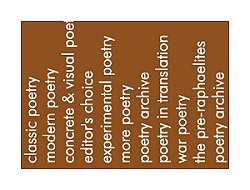
Kempner, Friederike
(1828-1904)
Gegen die Vivisektion
Ein unbekanntes Band der Seelen kettet
Den Menschen an das arme Tier,
Das Tier hat seinen Willen – ergo Seele –
Wenn auch ‘ne kleinere als wir.
Ein Mensch, mißbrauchend die Gewalt und Stärke,
Ein lebend Herz zerreißend – wie?
Wer gleicht denn hier dem wilden Tiere,
Ist es der Mensch, ist es das Vieh?
Kempner, Friederike poetry
fleursdumal.nl magazine
More in: Archive K-L, CLASSIC POETRY
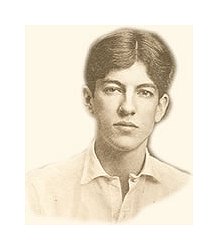
Alan Seeger
(1888-1916)
Sonnet IX
Amid the florid multitude her face
Was like the full moon seen behind the lace
Of orchard boughs where clouded blossoms part
When Spring shines in the world and in the heart.
As the full-moon-beams to the ferny floor
Of summer woods through flower and foliage pour,
So to my being’s innermost recess
Flooded the light of so much loveliness;
She held as in a vase of priceless ware
The wine that over arid ways and bare
My youth was the pathetic thirsting for,
And where she moved the veil of Nature grew
Diaphanous and that radiance mantled through
Which, when I see, I tremble and adore.
Alan Seeger poetry
fleursdumal.nl magazine
More in: Archive S-T, Seeger, Alan
Elsa von Freytag-Loringhoven
(1874 – 1927)
ONLY ADVENTUROUS ARE RICH
ONLY ADVENTUROUS ARE RICH –
RICH ARE ADVENTUROUS.
SOON AS IN STABLE
CULTURES’ TRADITIONS’ SECURITY
THEY
CEASE SO TO BE –
STAGNATIONGERM WORMS
UNDERGROUND PASSAGE
TO OBLIVION.
FLUX
LINDBERGH ONLY COULD SPRING
FROM OBSCURE VASTNESS’ REJUVENATED
VIRGIN SOILS’ FERTILE MIXTURE –
VITALY FOCED
TO EXPLORE ITSELF.
E.V.F.L
Elsa von Freytag-Loringhoven poetry
fleursdumal.nl magazine
More in: Archive E-F, Dada, Freytag-Loringhoven, Elsa von

The Sorrows of Young Werther (40) by J.W. von Goethe
MARCH 24.
I have tendered my resignation to the court. I hope it will be accepted,
and you will forgive me for not having previously consulted you. It
is necessary I should leave this place. I know all you will urge me to
stay, and therefore I beg you will soften this news to my mother. I am
unable to do anything for myself: how, then, should I be competent to
assist others? It will afflict her that I should have interrupted that
career which would have made me first a privy councillor, and then
minister, and that I should look behind me, in place of advancing. Argue
as you will, combine all the reasons which should have induced me
to remain, I am going: that is sufficient. But, that you may not be
ignorant of my destination, I may mention that the Prince of–is here.
He is much pleased with my company; and, having heard of my intention
to resign, he has invited me to his country house, to pass the spring
months with him. I shall be left completely my own master; and, as we
agree on all subjects but one, I shall try my fortune, and accompany
him.
APRIL 19.
Thanks for both your letters. I delayed my reply, and withheld this
letter, till I should obtain an answer from the court. I feared my
mother might apply to the minister to defeat my purpose. But my request
is granted, my resignation is accepted. I shall not recount with what
reluctance it was accorded, nor relate what the minister has written:
you would only renew your lamentations. The crown prince has sent me
a present of five and twenty ducats; and, indeed, such goodness has
affected me to tears. For this reason I shall not require from my mother
the money for which I lately applied.
MAY 5.
I leave this place to-morrow; and, as my native place is only six miles
from the high road, I intend to visit it once more, and recall the happy
dreams of my childhood. I shall enter at the same gate through which
I came with my mother, when, after my father’s death, she left that
delightful retreat to immure herself in your melancholy town. Adieu, my
dear friend: you shall hear of my future career.
MAY 9.
I have paid my visit to my native place with all the devotion of a
pilgrim, and have experienced many unexpected emotions. Near the great
elm tree, which is a quarter of a league from the village, I got out of
the carriage, and sent it on before, that alone, and on foot, I might
enjoy vividly and heartily all the pleasure of my recollections. I stood
there under that same elm which was formerly the term and object of my
walks. How things have since changed! Then, in happy ignorance, I sighed
for a world I did not know, where I hoped to find every pleasure and
enjoyment which my heart could desire; and now, on my return from that
wide world, O my friend, how many disappointed hopes and unsuccessful
plans have I brought back!
As I contemplated the mountains which lay stretched out before me, I
thought how often they had been the object of my dearest desires. Here
used I to sit for hours together with my eyes bent upon them, ardently
longing to wander in the shade of those woods, to lose myself in those
valleys, which form so delightful an object in the distance. With what
reluctance did I leave this charming spot; when my hour of recreation
was over, and my leave of absence expired! I drew near to the village:
all the well-known old summerhouses and gardens were recognised again; I
disliked the new ones, and all other alterations which had taken place.
I entered the village, and all my former feelings returned. I cannot,
my dear friend, enter into details, charming as were my sensations:
they would be dull in the narration. I had intended to lodge in the
market-place, near our old house. As soon as I entered, I perceived that
the schoolroom, where our childhood had been taught by that good old
woman, was converted into a shop. I called to mind the sorrow, the
heaviness, the tears, and oppression of heart, which I experienced in
that confinement. Every step produced some particular impression. A
pilgrim in the Holy Land does not meet so many spots pregnant with
tender recollections, and his soul is hardly moved with greater
devotion. One incident will serve for illustration. I followed the
course of a stream to a farm, formerly a delightful walk of mine, and
paused at the spot, where, when boys, we used to amuse ourselves making
ducks and drakes upon the water. I recollected so well how I used
formerly to watch the course of that same stream, following it with
inquiring eagerness, forming romantic ideas of the countries it was to
pass through; but my imagination was soon exhausted: while the
water continued flowing farther and farther on, till my fancy became
bewildered by the contemplation of an invisible distance. Exactly such,
my dear friend, so happy and so confined, were the thoughts of our good
ancestors. Their feelings and their poetry were fresh as childhood.
And, when Ulysses talks of the immeasurable sea and boundless earth,
his epithets are true, natural, deeply felt, and mysterious. Of what
importance is it that I have learned, with every schoolboy, that the
world is round? Man needs but little earth for enjoyment, and still less
for his final repose.
I am at present with the prince at his hunting lodge. He is a man with
whom one can live happily. He is honest and unaffected. There are,
however, some strange characters about him, whom I cannot at all
understand. They do not seem vicious, and yet they do not carry the
appearance of thoroughly honest men. Sometimes I am disposed to believe
them honest, and yet I cannot persuade myself to confide in them. It
grieves me to hear the prince occasionally talk of things which he has
only read or heard of, and always with the same view in which they have
been represented by others.
He values my understanding and talents more highly than my heart, but I
am proud of the latter only. It is the sole source of everything of our
strength, happiness, and misery. All the knowledge I possess every one
else can acquire, but my heart is exclusively my own.
The Sorrows of Young Werther (Die Leiden des jungen Werther) by J.W. von Goethe. Translated by R.D. Boylan.
To be continued
fleursdumal.nl magazine
More in: -Die Leiden des jungen Werther, Goethe, Johann Wolfgang von
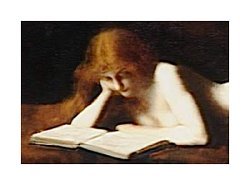
Bachten de Kupe
Je kunt wel putten in de aarde vloeken
omdat gebeden schaars zijn en schuren
als zand, maar beter is het trots te zijn
omdat je ergens gebleven bent. Waar je
dolend wakker kunt worden uit gemelijk
genot, geschaakte dromen, verzakende
grenzen. Waar je een vogel van vele lentes
herkent als jezelf. Toen ik ontwaakte wist
ik loepzuiver weer hoe gisteren voor me
een meisje huppelend riep: “Een olm is
een iep! Een olm is een iep! Een olm is
een iep!” Het is hier niet druk, maar kijk:
hier loopt niet ieder in zijn eigen ochtend.
Bert Bevers
Verschenen in Ballustrada, jaargang 27, nummer 1-2, Terneuzen, 2013
fleursdumal.nl magazine
More in: Archive A-B, Bevers, Bert
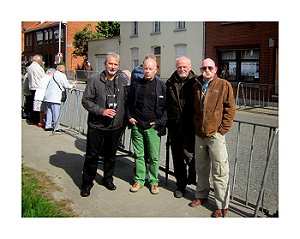
GeelZucht krijgt vijfde editie: Ook dit jaar gaat de poëzieploeg van GeelZucht er nog een keer tegenaan: de Tour de France verslaan in gedichten. Vanaf zaterdag 5 juli staat er dagelijks vanaf ten laatste 19.00 uur een kersvers gedicht over de etappe van de dag online. Het is reeds de vijfde editie van GeelZucht. De ploeg bestaat deze keer uit (van links naar rechts) Paul Rigolle, Frank Pollet, Patrick Cornillie, Bert Bevers en (niet op de foto) Fleur De Meyer.
Op donderdag 24 juli 2014 zal de voltallige GeelZuchtPloeg tijdens de rit van die dag (Pau-Hautacam) aanwezig zijn in de Openbare Bibliotheek van Sint-Niklaas, aan het Hendrik Heymanplein 3 aldaar. Daar en dan kan het publiek de rit over onder andere de Col du Tourmalet volgen, én bijwonen hoe de GeelZuchtPloeg met zijn vijven samen één gedicht schrijft. Ook dat is te bekijken, want het gedicht wordt geschreven met behulp van 5 laptops waarmee de dichters in één en hetzelfde document aan één en hetzelfde gedicht werken. Dat alles wordt live geprojecteerd, zodat elk woord, elke komma, doorhaling, verbetering op de voet te volgen is.
# Meer informatie op website Geelzucht
fleursdumal.nl magazine
More in: Art & Literature News, Bevers, Bert, The talk of the town
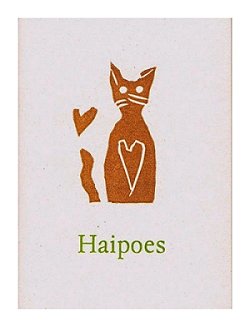
Haipoes, nieuwe dichtbundel van Freda Kamphuis
Onlangs is de nieuwe haikubundel ‘Haipoes’ van Freda Kamphuis uitgegeven binnen het poëziefonds van Triona Pers in Houwerzijl.
Haipoes bevat 10 haiku’s over katten en andere dieren. Uitgever Dick Ronner heeft het bundeltje met de hand gedrukt van de Lectura. De vinylsnede op het omslag heeft (dubbeltalent: beeldend kunstenaar en schrijver) Freda Kamphuis speciaal voor deze bundel gemaakt.
in katzwijm
kat ligt op het dak
op en top een kat te zijn
zo lui als een zwijn
Haipoes is te bestellen via de link: http://www.zolderman.nl/triona/index.html
Haipoes meet 7 x 10 cm, telt 16 pagina’s en kost € 3,50.
# Meer informatie website Freda Kamphuis
fleursdumal.nl magazine
More in: - Book News, Archive K-L, Art & Literature News, Kamphuis, Freda
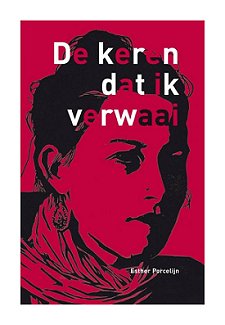
Herfst,
Laat mij nog even niet veranderen,
Laat mij nog even geen herhaling zien
Van: “Ouwe koek en net als vorig jaar en zie je wel dacht ik al.”
Van: “Dat zei ik vroeger al, het ligt aan de rest aan de anderen
Het is de schuld van de buitenwereld, ik heb altijd gelijk en de rest verandert.”
Laat mij nog even alles zien alsof het nieuw is, dat er nog geen naam voor is.
Laat mij nog even bedenken hoe het moet heten.
Laat mij nog even niet die oude man worden die alles al benoemd heeft.
Wil je alsjeblieft nog even wachten?
Ik wacht dan met je mee dan turen we samen naar de wereld.
En noemen we alles oneindig vaak omdat we nog niks kennen.
Omdat we nog even niet binnen hoeven te zijn.
Omdat we nog even niet elk jaar hetzelfde ritueel.
Omdat we nog even geen grijsheid zien
Omdat we alle kleuren kunnen bedenken.
We kunnen alles bekijken, als jij ons de kleuren teruggeeft.
Nog even geen dikke sokken zelfde verhalen weer die éne oom.
Nog even niet koud nog even geen oude gedachten herinneringen.
Nog even niet?
Esther Porcelijn
fleursdumal.nl magazine
More in: Archive O-P, Porcelijn, Esther
Thank you for reading Fleurs du Mal - magazine for art & literature